When I made my New Year's Movie Resolutions earlier this year, I vowed to watch more black cinema. In light of this, I thought it would be appropriate to revamp this list. So on this final day of Black History Month, I present to you my Top 10 list of my favourite black films, actors and directors:
Lists
▼
Friday, February 28, 2014
Thursday, February 27, 2014
A ROTTEN TOMATO: Sweet Sweetback's Baadasssss Song
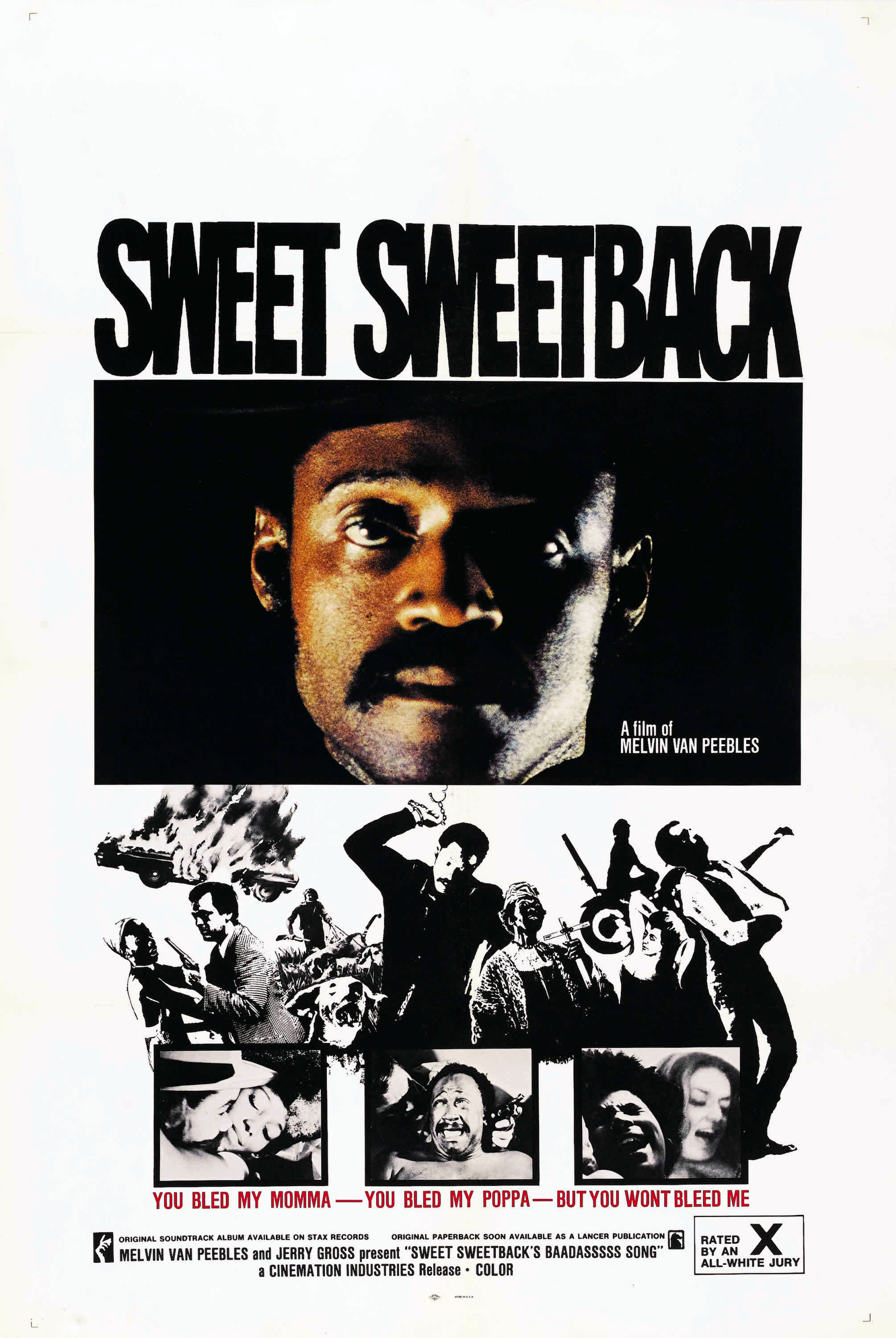
This week I decided to stray into the realm of avant-garde with "Sweet Sweetback's Baadassssss Song". It's said that this is the seminal blaxploitation film, so I naturally I was curious to check it out. Well, I'm sorry to report that I was wholly turned off by what it was trying to do.
What is the film trying to do? Well, that's a good question. After enduring this film for 97 minutes, I'm still unclear as to its intentions. From what I recall, there's a man named Sweetback (Melvin Van Peebles) who's good in bed and is a known badass. Due to his badassness, he gets into trouble with some racist cops (he attacks them after they beat up a black man), forcing him to go on the run. Throughout his great escape, he is aided by "the black community" (literally, the opening credits state "Starring: The Black Community"), positing the theory that all black people need to work together to fight "the Man". Certainly, there was some legitimacy to this claim during that era (the early 1970s), but the imagery this film focuses on created some insurmountable problems for me.
Within the opening minutes of the film, we are privy to a young boy (Sweetback) being forced to have sex with an older woman. He grows up to be a prostitute, engaging in exhibitionist sex in front of crowds of people. There's no reason for it, leaving me to assume that it's only there for the shock value. All throughout, it portrays black people in an unfavorable light, seemingly at odds with the message it claims to convey. When it's not depicting vulgar acts of public indecency, it's preoccupied with strange scenes like a heavyset man taking a dump. So on the one hand, it's employing a bold experimental filmmaking sensibility but conversely, it's also attempting to tell a linear story with a black power message. Unfortunately, the two styles don't mix.
In the end, it all comes across like the work of a filmmaker who's trying too hard. With its murky cinematography and muddled script, it feels more in line with a scrappy student film than a serious production. I give the director points for trying something different within the confines of conventional black cinema, but the finished product fails to be artistically or thematically engaging. For a film that supposedly speaks for the entire black community, I think we deserve better.
This film is part of my Black Cinema marathon.
PODCAST: Academy Awards Appreciation

I recently had a nice chat on The Film Pasture podcast with the lovely Lindsay Street (French Toast Sunday). We discussed the importance of the Oscars, as well as general things we do and don't like about them. Click on the link below to have a listen.
http://thefilmpasture.podomatic.com/entry/2014-02-26T17_58_20-08_00
Wednesday, February 26, 2014
Oscar Season: The Musical
Are you ready for the Oscar ceremony on Sunday? If not, then maybe a little song and dance will get you in the mood! The cool folks of Wayside Creations have created a fun video titled "Oscars Season: The Musical". Check it out below:
MOTIFS IN CINEMA 2013: Appreciation of Life

Motifs in Cinema is a discourse across film blogs, assessing the way in which various thematic elements have been used in the 2013 cinematic landscape. How does a common theme vary in use from a comedy to a drama? Are filmmakers working from a similar canvas when they assess the issue of death or the dynamics of revenge? Like most things, a film begins with an idea – Motifs in Cinema assesses how various themes emanating from a single idea change when utilised by varying artists.
"Appreciation of Life" is a theme that is fairly common throughout film history. When we go to the cinema we often seek a certain level of escapism that lends itself to positive life-affirming stories. In that regard, one can approach the theme from two different perspectives. For example, a film can convey appreciation of life through its characters' own attitudes. On the other hand, the construct of a film may convey the theme by allowing you to appreciate the life of a character (biopics and documentaries are especially good for this). With that in mind, I will be highlighting 6 different films that relate to the theme of Appreciation of Life. Though they vary in scale and genre, they are all linked by this common theme.
Monday, February 24, 2014
MOVIE OF THE WEEK: Menace II Society
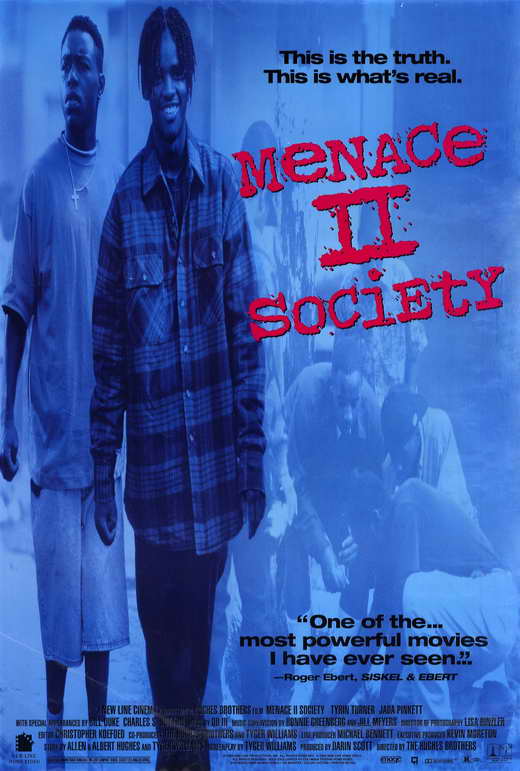
My top pick this week is a film that introduced a pair of new talents back in 1993 - "Menace II Society". Directed by Albert and Allen Hughes, it is certainly one of the most remarkable debuts in the past few decades. This cautionary tale boldly illustrates the dangerous lives of a group of young black men living in the ghetto.
The protagonist of this story is a young man named Caine (Tyrin Turner). Fresh out of high school, he decides to follow the usual path of his peers - selling drugs and hustling to survive. This is indeed another story about the urban struggle (as discussed previously in "Fresh"), but the way that the Hughes brothers approach the material distinguishes itself from other black films.
On watching the "Menace II Society", there are fascinating comparisons to be made with the topical black films of the moment ("12 Years A Slave", "The Butler", "Fruitvale Station"). Those popular 2013 releases all put forth the common sentiment of victimization by an unfair, predominantly white society. It's an understandable concern, but perhaps it doesn't give you the full picture (many have already criticized the depiction of the police in "Fruitvale Station"). As a result, the alternate approach of "Menace II Society" feels truly incendiary. Rather than placing the blame on the white man, the directors chose to illuminate the destructive behaviour of young thugs in South Central Los Angeles. In doing so, they make a fervent plea for a change in attitudes and the resulting film truly jolted me.
From the first scene, it's clear that the duo will pull no punches. Best friends Caine and O-Dog (Larenz Tate) enter a corner store to buy liquor, only to engage in an argument with the shopkeepers. Out of nowhere, a trivial comment about O-Dog's mom ends in tragedy. He empties several rounds of bullets into the man and his wife. This incident hangs over the rest of the movie, showing a troubling disregard for human life that is common throughout most of the film's characters. Though Caine is remorseful, O-Dog is proud of his actions, happily screening the surveillance tape for his friends at repeated times in the film. Clearly, there are serious endemic psychological issues within such a society.
As shocking as that opening sequence is though, it's just one of many such instances of sickening violence. Yet rather than feeling too exploitative and extreme, the script manages to include some unexpected glimpses of humanity. It would have been easy to just portray the unending cycle of violence, but inclusion of several voices of reason greatly assists in putting forth the film's message. Caine's grandparents, his friend Ronnie and a wise father figure try to guide him on the right path. He's offered a way out, but will he take it?
The buildup to resolving that question takes Caine through many obstacles. Indeed, every negative stereotype of black culture seems to be touched upon, almost to the point of parody. Admittedly, it holds back the film from realizing its full artistic potential. Still, the social commentary is so rigorous and staggering that it's hard to ignore the film's value. Much like a documentary, this is a case where the subject of the film is the most important concern. That the film also has such an impressive directorial vision (the camera work is particularly impressive) is just the icing on the cake. In the history of black cinema, "Menace II Society" is undoubtedly one of the most essential works.
This film is part of my Black Cinema marathon.
Friday, February 21, 2014
GUEST POST: An Oscar Party to Remember

I love a good party and am always willing to entertain, so the glitz and glamour of the Oscars offers me plenty of inspiration to create a fun and festive event. What follows is my guide to creating an event that your guests will not only remember, but will make them fight hard to secure their place on next year’s guest list.
Wednesday, February 19, 2014
The 6 Key Predictions for your Oscar Pool
After a long awards season with an abundance of precursors, the Oscar ceremony can sometimes feel anticlimatic in terms of the winners. Most of the categories have such strong frontrunners that I'm sure that the many nominees don't even bother preparing acceptance speeches. Still, there are always more or less 6 categories that are still unknown quantities ahead of the big night. Predicting those categories can therefore make the difference between winning and losing your office Oscar pool. This year, these are the categories that you need to pay particular attention to (apart from the shorts of course):
Monday, February 17, 2014
MOVIE OF THE WEEK: The Attack

My top pick of the week is the 2012 Lebanese drama "The Attack". Set in Tel Aviv, the film is framed around the Israel-Palestinian conflict, exploring the way it impacts our central character - a Palestinian surgeon named Amin (played by Ali Suliman). As the events of the film unfold, he goes through feelings of betrayal and disillusionment as a fateful incident changes his life forever.
On approaching "The Attack", I anticipated much after its successful run through the 2012 festival circuit. Its subject matter (the Israeli-Palestinian conflict) has produced a slew of films that I greatly admire. Based on what I was hoping for then, the film had its strengths and a few minor disappointments.
The film begins with a shocking act of terrorism, as a suicide bomber has caused the deaths of many persons. Based on the nature of her injuries, Amin's wife turns out to be the prime suspect. When he finds out, he reacts with staunch denial. In his eyes, his level-headed, peaceful wife just couldn't be the perpetrator of such extreme violence. However, he is eventually forced to come to terms with the facts. The plot therefore follows his gradual process of understanding.
This quest for answers leads the film down a path that it often struggles to engage fully with. I stated earlier that the film had some minor disappointments and that feeling stems mainly from the film's overall tone/style. Strangely enough, my expectations were based on films that weren't specifically related to the film's topic. Namely, I was hoping for either a brooding mystery in the vein of "Incendies" or a tense thriller like "Zero Dark Thirty". It's perhaps an strange comparison, but these films all share fairly similar Middle Eastern settings, socio-cultural implications and plot elements (mystery and/or investigation). Most importantly, I view them as high stylistic achievements and as such, they were constantly in the back of my mind.
Of course, judging a film based on another is a foolhardy thing to do. "The Attack" is neither a complicated mystery story nor a white knuckle thriller. Rather, it's an psycho-emotional drama about a man and his enlightenment about his wife and his society. This is actually compelling in itself, but the way that the script handles these issues left me unsatisfied.
Mainly, his reflections on his wife takes away some of the potency of the film. The flashback scenes are understandably nostalgic (he has nothing but fond memories of her) but they're altogether a bit too precious for the situation at hand. Considering the fact that he witnessed the horrifying aftermath first hand, it undermines the evident severity of her actions.
Similarly, this sentimentality takes away from some of the story's larger social themes. Despite being Palestinian, Amin is more in line with the Israeli/Jewish point of view. Hence, there's a crucial subplot about his perception of martyrdom that isn't given its due weight until late in the game. Consequently, the bulk of the film is somewhat impenetrable for the viewer, as it lacks the urgency that its title suggests while simultaneously avoiding deeper engagement with the psychology of all involved. As the film is based on a novel, it's possible that the literary source expands more on its ideas. From the way the script is presented, it obviously lends itself to many introspective moments that are inevitably difficult to translate to the screen.
Yet despite my criticisms, this is essentially a well-made film. There's something sincerely touching about the blind ignorance caused by love and those flashback scenes are directed and acted beautifully. Likewise, the film's resolution leaves a significant emotional impact. Clearly, Ali Suliman is a capable vessel for a character study, so it's unfortunate that the screenwriting isn't as dexterous as he is. Overall though, the film has enough strong elements to impress. Just temper your expectations beforehand.
Sunday, February 16, 2014
OSCAR WATCH: BAFTA Awards
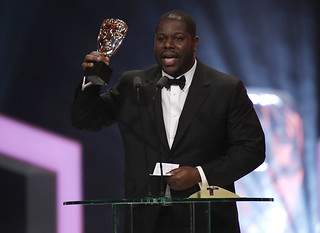
As I suspected when making my predictions, today's BAFTA Awards were set to raise some question marks throughout many Oscar races. That's exactly how it turned out, with a few prizes going to contenders that aren't even Oscar nominated! The big winner of the day was Gravity with 6 awards, but 12 Years won where it mattered - Best Picture. It's still a very competitive season, so I think we're gonna have a very interesting Oscar night. This year I got 14 out of 22 predictions correct. Here's the full rundown of winners:
Best Picture
12 Years A Slave (pictured above)
Best British Film
Gravity
Best Actor
Chiwetel Ejiofor, 12 Years a Slave
Best Actress
Cate Blanchett, Blue Jasmine
Best Supporting Actor
Barkhad Abdi, Captain Phillips
Best Supporting Actress
Jennifer Lawrence, American Hustle
Director
Alfonso Cuaron, Gravity
Saturday, February 15, 2014
OSCAR WATCH: BAFTA Predictions

Tomorrow is the last stop on the televised precursor circuit and it may well indicate some changing winds in various categories. With a few strong frontrunners missing (McConaughey, Leto, Jonze) this is a tough set of awards to predict. So many of these feel wide open. As a result, I don't expect much success with my predictions. I'm taking a risk with this strong showing for "12 Years A Slave" but as they say, go big or go home. Here are my predictions for this year's BAFTA Awards:
Best Picture
12 Years A Slave
Best British Film
Philomena
Best Actor
Chiwetel Ejiofor, 12 Years a Slave
Best Actress
Cate Blanchett, Blue Jasmine
Best Supporting Actor
Michael Fassbender, 12 Years a Slave
Best Supporting Actress
Lupita Nyong'o, 12 Years A Slave
Director
Alfonso Cuaron, Gravity
Friday, February 14, 2014
COMING SOON: Muppets Most Wanted
One of my all-time favourite franchises is the Muppets and they're back with their latest adventure "Muppets Most Wanted". Apart from the delight of the actual films, the marketing for this generation of Muppet films is always on point. Check out some of the hilarious TV spots below. "Muppets Most Wanted" opens on March 21.
Wednesday, February 12, 2014
A ROTTEN TOMATO: The Nutty Professor

The Adam Sandler brand of dumb comedy is widely viewed (by cinephiles) as a plague on contemporary movie culture. However, after watching Jerry Lewis "The Nutty Professor", I can confidently say that there has been and always will be an audience for that kind of humour. It's a sad truth but thankfully, smart comedy is also still being made. Of course, silly humour can be satisfying when done right, but usually the jokes are so broad that it eventually outstays its welcome. In the case of "The Nutty Professor", it's most definitely the latter.
You're probably already familiar with the plot of this film, due to the 1996 Eddie Murphy remake. If you've managed to avoid it however, then here's a quick rundown. The title character (played by Jerry Lewis) is a nerdy professor who is clumsy and socially inept. He gets no respect from his students and his love life is non-existent. After being locked up in a closet by a bully one day, he's aided by a kind, attractive woman from his class (Stella Purdy, played by Stella Stevens). Smitten by her obvious interest, he begins to wonder what it would be like to be her man. Unfortunately, he feels unworthy of her so he uses his brains to devise a solution. He ends up creating a potion that will transform him into a smooth, confident stud. There's one big side effect though. His alter-ego Buddy Love is an arrogant jerk. As you can probably tell, the film aims to send the message that inner beauty is what matters. Unfortunately, the film compromises that message by some curious filmmaking choices throughout.
Firstly, Lewis' performance as the professor is grossly extreme. We're meant to root for him but he's made out to be such a complete (and often annoying) dope, that it's hard to attach yourself to the character. In fact, I'd prefer to be around Buddy Love, flaws and all. Still, even that character has its issues, which relates to my other major complaint - the writing.
The writing certainly leaves a lot to be desired, mainly due to some troublingly archaic representations of male-female relationships. In particular, the first meeting between Stella and Buddy is bizarre. She's a headstrong girl who clearly isn't flattered by his courtship, but she still manages to end that night cooped up with him some dark, lonely hideout! As I mentioned earlier with regards to the professor, the film's characterizations are very broad and hence, Buddy is played as quite the obnoxious creep. I swear, if it weren't for the Motion Picture Production Code, I would have been worried that a rape was about to occur. In the context of this patriarchal world though, it seems quite normal for a girl to submit herself completely to the domineering man. Perhaps I'm applying too much of a modern perspective, but it's something that really irked me thoughought (even in her relationship with the professor).
Great comedies tend to reveal some amusing truths about human behaviour and society (even at their most slapstick). Sadly, this film is too far removed from reality to realize its full potential. Jerry Lewis is clearly a talented physical comedian, but the nonsensical material he gave himself (he's the co-writer) does him a great disservice. This professor is definitely nutty, but he's also a bit unbearable. Clearly, the film has failed its purpose. The remake is better. There, I said it.
Monday, February 10, 2014
MOVIE OF THE WEEK: The Kings of Summer
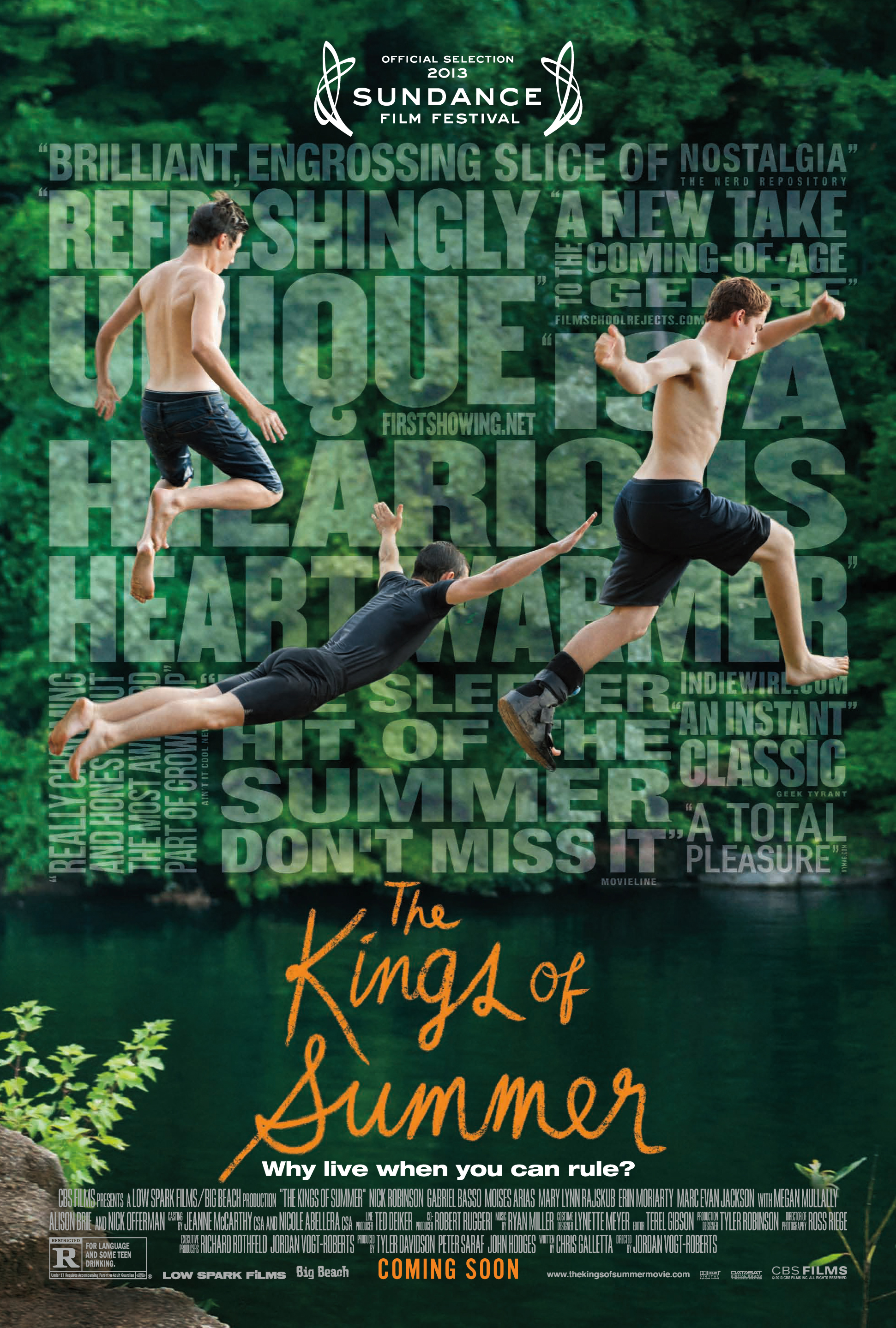
Boys will be boys. The opening scene of this week's top pick "The Kings of Summer" reinforces this saying with the image of our 3 protagonists goofing around in the woods, banging on a pipe and dancing to the music. Some may find the notion a bit reductive, but I can't think of any other way to describe the essence of this joyous little film.
That brief opening is actually taken from the midsection of the plot, after Joe (Nick Robinson), Patrick (Gabriel Basso) and Biaggio (Moises Arias) have accomplished their goal of setting up a hideaway in the woods. They're living the dream of adolescents the world over, running away from their annoying parents and building their own home. It's the summer and they just wanna have some fun. There's not much else to the story apart from this adventure, but that youthful delight is surprisingly enough to sustain interest.
Indeed, it's the simplicity of the narrative that makes this so great. The film is a terrific ode to boyhood, perfectly capturing the behaviour of your typical young male. Their mischievous, rebellious nature and sense of camaraderie is instantly identifiable and relatable. Many films have tapped into this, but rarely has this perspective ever been so pure. Specifically, most teen movies incorporate sex, drugs and general debauchery. In a way then, the innocence of this story is its own form of rebellion. Here it's all harmless fun. They're not skipping school like Ferris Bueller or wreaking havoc in the neigbourhood. This is true friendship, where each other's company is enough.
One can easily understand their old-fashioned enjoyment, as these quirky personalities provide more than enough entertainment on their own. Arias is particularly hilarious as Biaggio (the wildcard of the group), providing endless laughs with his quirky demeanor. In fact, the film is filled with excellent comedic talent, including the likes of Nick Offerman, Megan Mullally and Marc Evan Jackson as the parents. They all play their part in making this an enjoyable watch from start to finish.
Really, this lite comedy would have been practically perfect if it weren't for the disappointingly conventional third act. As if to devalue the worth of merely conveying "youthful joie de vivre", it inserts the usual coming of age elements to add a sense of poignancy. It's not egregious, but the sudden rush of drama felt unnecessary. Thankfully, it didn't damage the film too much, as the intended feeling of the film is still intact. It's awesome to be young and carefree. Sigh.
Saturday, February 8, 2014
OSCAR WATCH: Nebraska
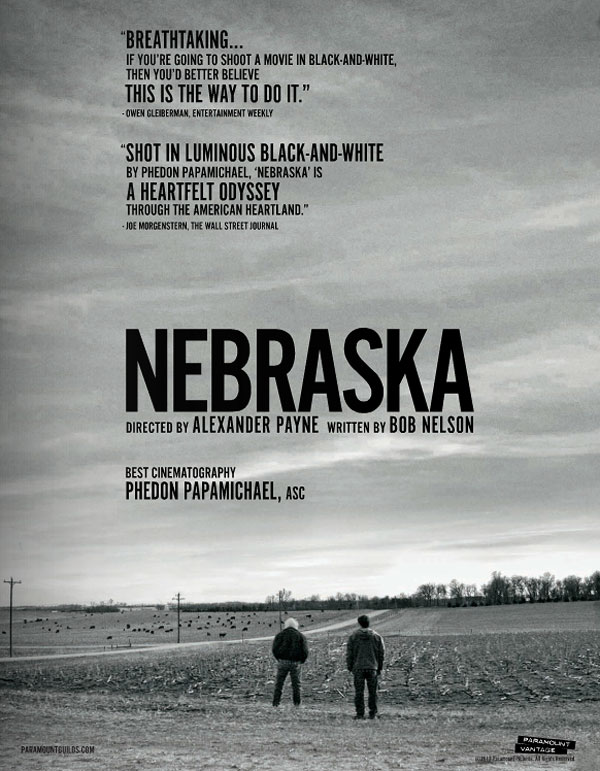
What do you do when you've lived your life and have nothing to look forward to? That seems to be the underlying question of Alexander Payne's latest film "Nebraska". In this dramedy, a man in his twilight years tackles this dilemma by engaging with an illusion of future wealth. The events of this film then, are a look into his journey to attain this prize.
This central figure is Woody Grant (Bruce Dern), an old man living in Montana who one day gets the surprise of his life. He has received a letter in the mail that claims he has won $1 million in a magazine sweepstakes. Enticed by his good fortune, he decides to venture to Nebraska to collect his winnings. Realizing the scam, his wife and sons attempt to dissuade him from going, but as is the wont of old men (especially alcoholic ones with symptoms of Alzheimer's), he refuses to listen. Woody will stop at nothing, even if it means walking the whole way. Realizing the futility of trying to change his mind, the younger son David (Will Forte) decides to accompany him for a road trip.
When Alexander Payne announced his ideas for his next film, I must admit that I wasn't all that excited. Even as a fan of his work, the concept just didn't seem that interesting on paper. For starters, the black and white cinematography sounded like an unnecessary gimmick. However, this turned out to be a false assumption as it actually served a purpose. The look of the film is cozily nostalgic, like a genuine throwback to a brilliant school of cinematography that was being swept aside when color film was set to completely take over. It particularly reminded me of films like "The Last Picture Show", perfectly capturing the stagnation of America's backwater towns.
The visuals fit nicely with the tone of the film, alternately warm and solemn with very dry humour. It's quite literally a "black and white" setting, with little flavour to spice it up. For the viewer though, that subtle humour is always present. Coupled with the fine editing, it goes to show that there is sometimes not much difference between comedy and drama. In this case, it's all about the timing. The characters may not realize they are being funny, but even their silences were comedic gold.
Although it's essentially a comedy, there's also a great dramatic backbone to the film. One of the other false assumptions I made about the film was that it would be a familiar story about the characters' futures. When one thinks of road trip movies, it's usually prominently about reinvention or some sort of character growth (e.g. "Thelma and Louise"). It's fascinating then, that much of this film concerns itself more with the past and present. As Woody's caretaker, the movie is as much about David's experience as it is about his father. Along the way, he learns more about his father's history with friends and family, giving him a deeper understanding of the man. The story eventually reveals itself to be primarily about the bond between a father and his son. Though they've been estranged, you can just sense the unspoken love between the two, thanks to the fine performances of Bruce Dern and Will Forte.
As you can tell, I was quite taken with this script. Even when I felt that it needed a more active forward momentum, there was no denying that this was a tremendous screenwriting debut for Bob Nelson. The film has some superb lines of dialogue but even more remarkable is the strong grasp on tone and theme. His script never explicitly explains whether Woody is purposely delusional, naive or suffering from impaired reasoning. What's more important is that he has loved ones who are always there to lean on. Of course, the film knowingly sets up its protagonists for disappointment and the constant threat of death. Yet despite this, it amusingly and poignantly celebrates this precious moment with the endearing members of the Grant family (even when they're being stubborn or foul-mouthed). If this film is based on a real person, then Bob Nelson gave that man a beautiful, graceful tribute.
Friday, February 7, 2014
#FF Philip Seymour Hoffman, David Finchuary and more...

I'm still at a loss for words regarding the death of Philip Seymour Hoffman. He truly was one of the greats in my opinion and I can't fathom that we won't be seeing him on screen again. In lieu of my own personal tribute, I've included some great in memoriam posts from fellow bloggers. Check those out along with the other interesting reads from the past week:
John wrote about his Top 10 Philip Seymour Hoffman Performances.
Mark assembled a fine assortment of Hoffman's memorable scenes with his tribute.
Nick remembers Hoffman's fantastic career with his In Memoriam post.
Josh made some interesting choices for the Lights Camera Reaction Recast-athon.
Sara is a new writer for French Toast Sunday and she wrote a cool article for the site's David Finchuary month.
Sverrir from The Cinematic Katzenjammer made an awesome list of the Best Hans Zimmer Tracks of 2013.
Wednesday, February 5, 2014
A ROTTEN TOMATO: I, Frankenstein

As you've probably noticed by now, I usually only write reviews for films that I like. There are two main reasons for this. First of all, I find it much easier to explain why I like something. In addition, I tend to avoid films that I suspect I'll hate. On the rare occasion that I encounter a film that I truly dislike (less than 2.5 stars), I give it a review on the "A Rotten Tomato" label. I mention this because the relevant film for this post is one that strongly reminds me why I've taken this stance. "I, Frankenstein" is a middling film that is as unimpressive as you've heard.
The film features a convoluted plot that focuses on Frankenstein's monster (named Adam here), played by Aaron Eckhart. After being rejected by Dr. Frankenstein, Adam kills the doctor's wife, spurring on another act of revenge. As Frankenstein chases his creation through an Arctic chill, he eventually dies, leaving the Adam to roam free. Adam decides to bury his creator, but is attacked by gargoyles who try to recruit him to fight some demons on earth. This progresses into a centuries-long war between these varying factions culminating in the modern day events of the film.
Yes, it all sounds layered and complex but don't be fooled. This is a "bare bones" script that only exists to set up the situations for a stream of derivative action scenes. There are promising elements due to the various characters and the moral conflicts at play, but this film is mostly concerned with its surface-level visuals. Admittedly, this special effects bonanza is occasionally thrilling but it's also so painstakingly juvenile in execution (dialogue, characterization) that it's hard to respect the filmmaking. The most egregious offense is the waste of a talented cast, namely Aaron Eckhart and Bill Nighy. As one of the top character actors in the business, it's sad that there's no specificity given to Nighy's villain role. Likewise, Eckart's lead character is altogether too bland to stir up much excitement.
In effect, "I, Frankenstein" is essentially a B-movie hiding behind a blockbuster VFX budget. This is particularly evident in the overblown finale where fireballs and grotesque creatures incoherently collide in a big final showdown. At the end of the film, it gives you a sort of hangover feeling as you regret the excesses that you just experienced. The lack of background story and thematic depth often makes it feel like a TV episode or a middle film in a franchise. Perhaps I would have been satisfied if it were in either of those forms. As a standalone feature film though, I can't help but see this as a failure.
Monday, February 3, 2014
MOVIE OF THE WEEK: Lore

My top film for this week is Cate Shortland's "Lore". Set in Germany during the time of World War II, it's a film that many may have dismissed, assuming that it treads familiar ground. I was apprehensive myself, so I was pleasantly surprised to find that it feels like a wholly fresh perspective on the topic (Nazism and its effects).
The story begins in the aftermath of the war. Hitler has been defeated and much of Germany is left in disarray. One such example is the family of our title character Lore (Saskia Rosendahl). Her Nazi parents have been taken away to a prison camp, leaving her to take care of her four younger siblings. With no home left to cling to, they must pack up and make their way to Hamburg to live with their grandmother.
As they go on their journey, it becomes clear that this is not your typical World War II drama. Rather than a recreation of events, this is a challenging character study with subtle coming of age elements. Young Lore has grown up as a Nazi sympathizer and is now forced to come to terms with her family's disturbing past. Brainwashed like many others, she's shocked by the unexpected images of dead Holocaust victims. Like many of us, she wonders how people could commit these atrocities. It's a question that has stumped mankind for centuries. From slavery to genocide, human injustice has brought to societies from every corner of the globe. It's something that is difficult to understand and Rosendahl displays this inner turmoil perfectly. Her acting has a raw quality that completely draws us in to her character. Her natural youth and naivety engenders empathy while her reactions to the truth question your own ability to sympathize. Particularly upon the arrival of Thomas (a young Jewish man), her confused fragility is fascinating to watch. She suddenly has to deal with conflicted feelings of prejudice and sexual awakening.
All along the way, she's aided immensely by a fearless script. The plot brings up many familiar questions of guilt and forgiveness but it never settles for the easy answers. No one gets a big comeuppance and there are no sudden realizations of wrongdoing. It proves to be the right approach, as the legacy of the Nazi regime is a deep well of complexities. The screenwriters (Cate Shortland and Robin Mukherjee) do a great job in striking the tricky balance between humanizing these people without justifying their actions.
We've already seen various World War II films that depict the horrors that Jewish families encountered. Now with "Lore", we get the other side of the coin, as the unwitting families of the perpetrators are examined. This is a film that fully engages the viewer, accomplished through a firm hand in the director's chair. It's a fine combination of formal artistry and plot-driven narrative. I truly couldn't take my eyes off the screen. It's evident that World War II still has some vital stories left to share.

